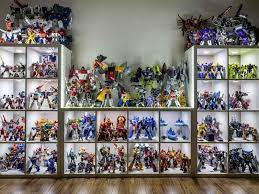The Art of Collection: Unveiling the Beauty of Objects
Collections are more than just a gathering of objects; they are a reflection of passion, dedication, and curiosity. Whether it’s stamps, coins, vintage cars, or rare books, collections hold a special place in the hearts of collectors around the world.
At the core of collection is the desire to preserve history, culture, and memories. Each item in a collection tells a story – a story of where it came from, who owned it before, and why it holds significance. Collectors often spend years meticulously curating their collections, seeking out rare pieces and connecting with fellow enthusiasts.
But collection is not just about accumulation; it’s also about appreciation. Collectors develop a keen eye for detail, craftsmanship, and beauty. They see beyond the surface value of an object and appreciate its unique qualities and history. Each addition to a collection is a moment of joy and satisfaction.
Moreover, collections serve as windows into different worlds. They offer insights into different cultures, historical periods, and artistic movements. They spark conversations and connections among people who share similar interests. Collections bridge gaps between generations and create bonds that transcend time.
So next time you come across a collection – whether in a museum or in someone’s home – take a moment to appreciate the artistry and dedication behind it. Collections are not just about objects; they are about passion, creativity, and the beauty of preserving what matters most.
Understanding Collections: Definitions, Synonyms, and Examples
- What is called collection?
- What is the synonym of collection?
- What do you call the items in a collection?
- What is an example of collection?
What is called collection?
A collection is a curated assembly of items that are purposefully gathered together based on a common theme, interest, or significance. It goes beyond mere accumulation and embodies a deliberate selection process that reflects the collector’s passion, knowledge, and personal connection to the objects. Each item in a collection holds intrinsic or sentimental value, contributing to a cohesive narrative or aesthetic that enriches the overall collection. Whether it comprises rare coins, vintage vinyl records, or antique jewellery, a collection is a reflection of the collector’s unique tastes and interests manifested through their cherished possessions.
What is the synonym of collection?
A common synonym for “collection” is “compilation.” Both terms refer to the act of gathering or assembling a group of items or things together. Whether it’s a collection of art pieces in a museum or a compilation of data for research purposes, these words convey the idea of bringing various elements into one cohesive whole. The synonym “compilation” also implies a sense of organization and purposeful arrangement, highlighting the curated nature of the gathered items.
What do you call the items in a collection?
In the realm of collecting, the items within a collection are commonly referred to as “collectibles” or “collectables.” These objects hold significance and value to collectors due to their rarity, historical importance, aesthetic appeal, or sentimental value. Whether it’s coins, stamps, art pieces, or antique toys, each collectible plays a unique role in enriching a collection and telling a story of its own. The term “collectibles” encapsulates the diverse range of items that collectors passionately seek out and cherish as part of their curated collections.
What is an example of collection?
A prime example of a collection is a numismatic collection, which consists of a variety of coins and currency from different time periods, regions, and denominations. Numismatic collectors often seek out rare or historically significant coins to add to their collection, appreciating the artistry, historical context, and monetary value of each piece. Through their collections, numismatists preserve a tangible record of economic history and cultural heritage, showcasing the evolution of currency over time.

